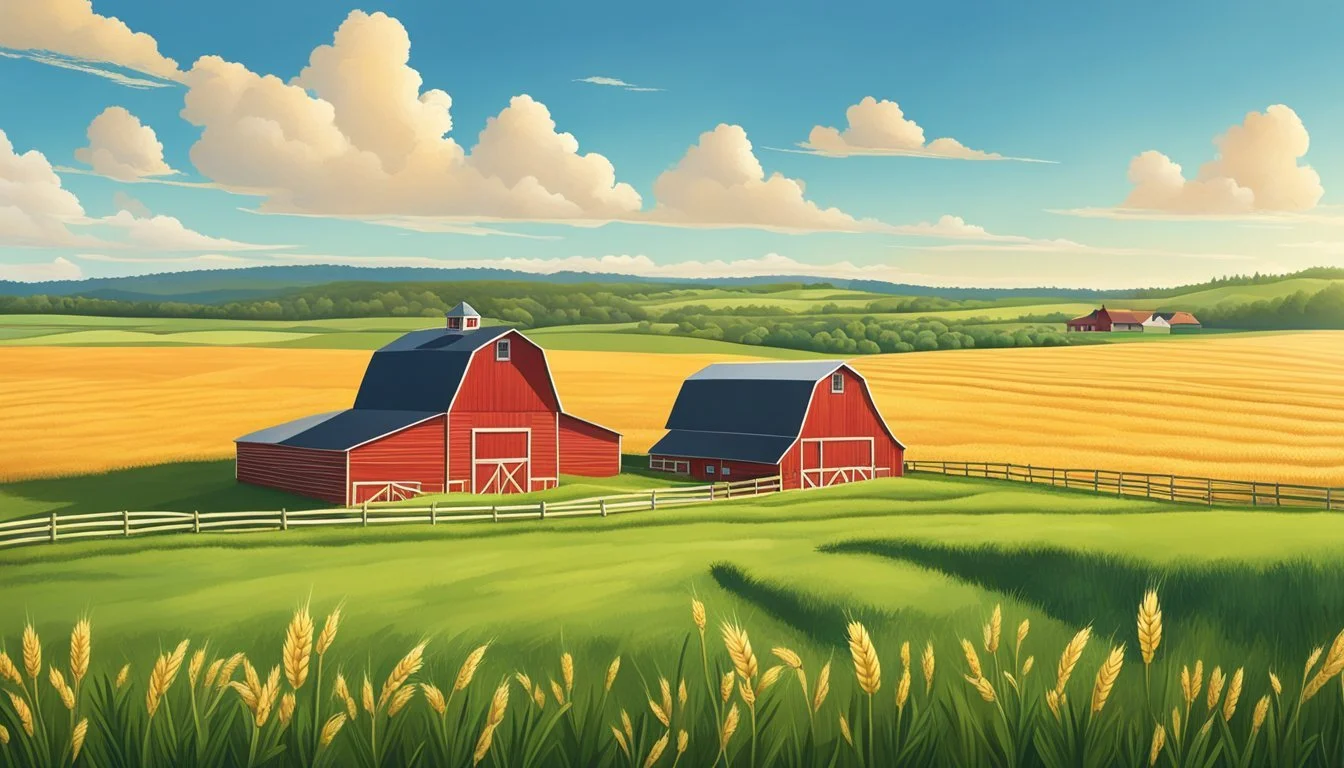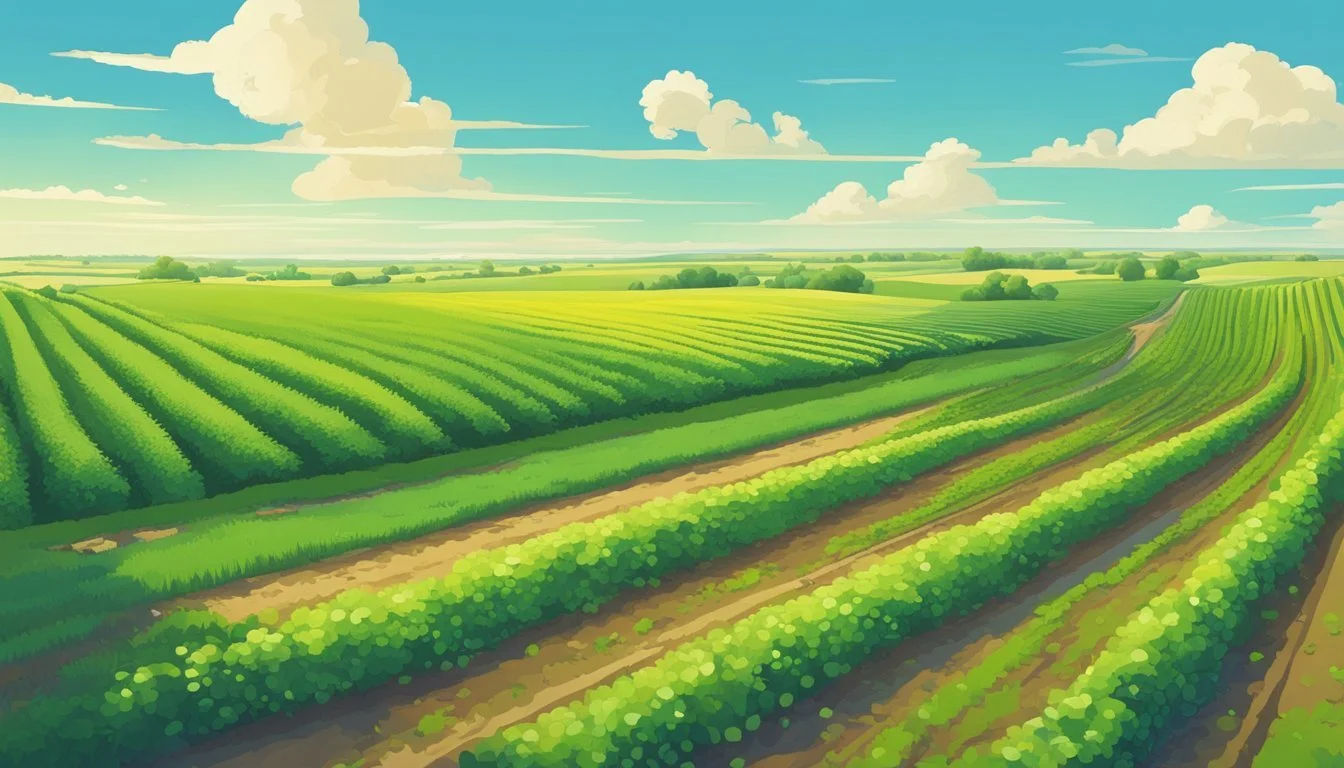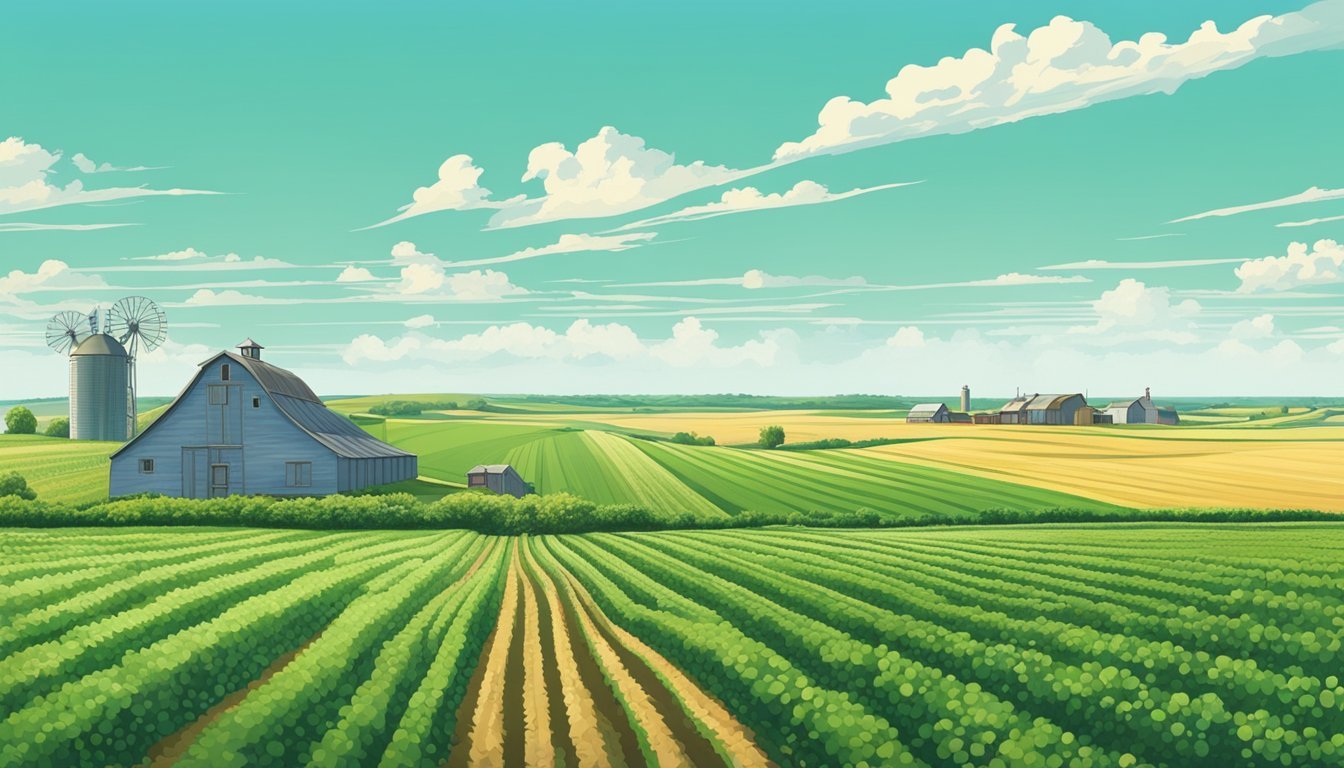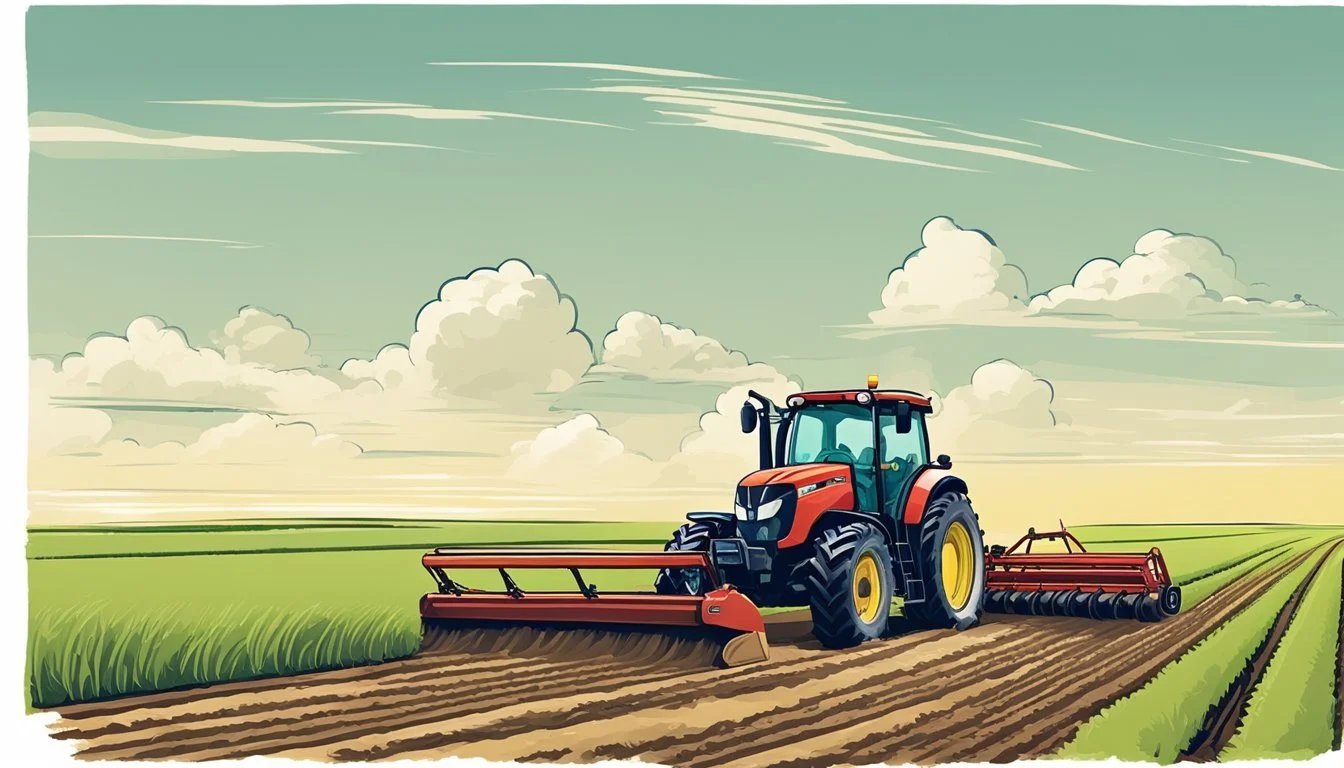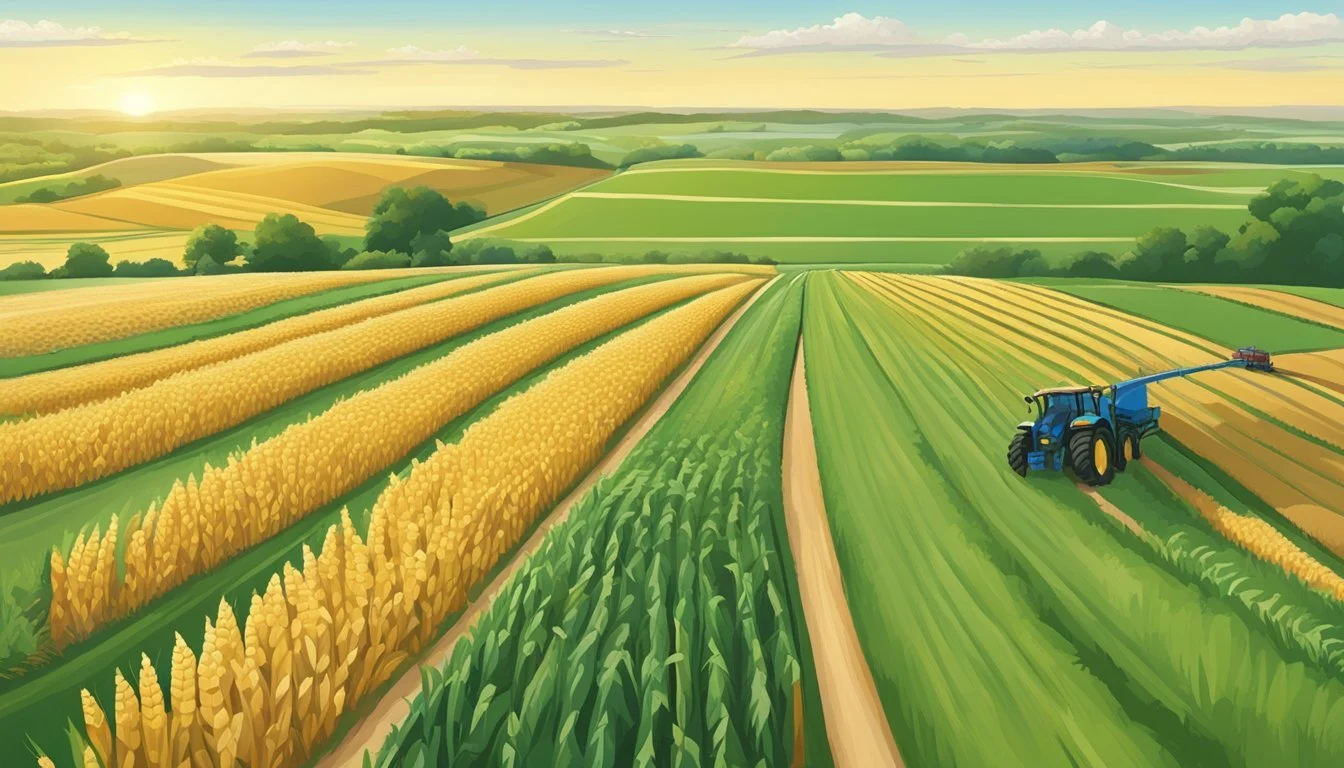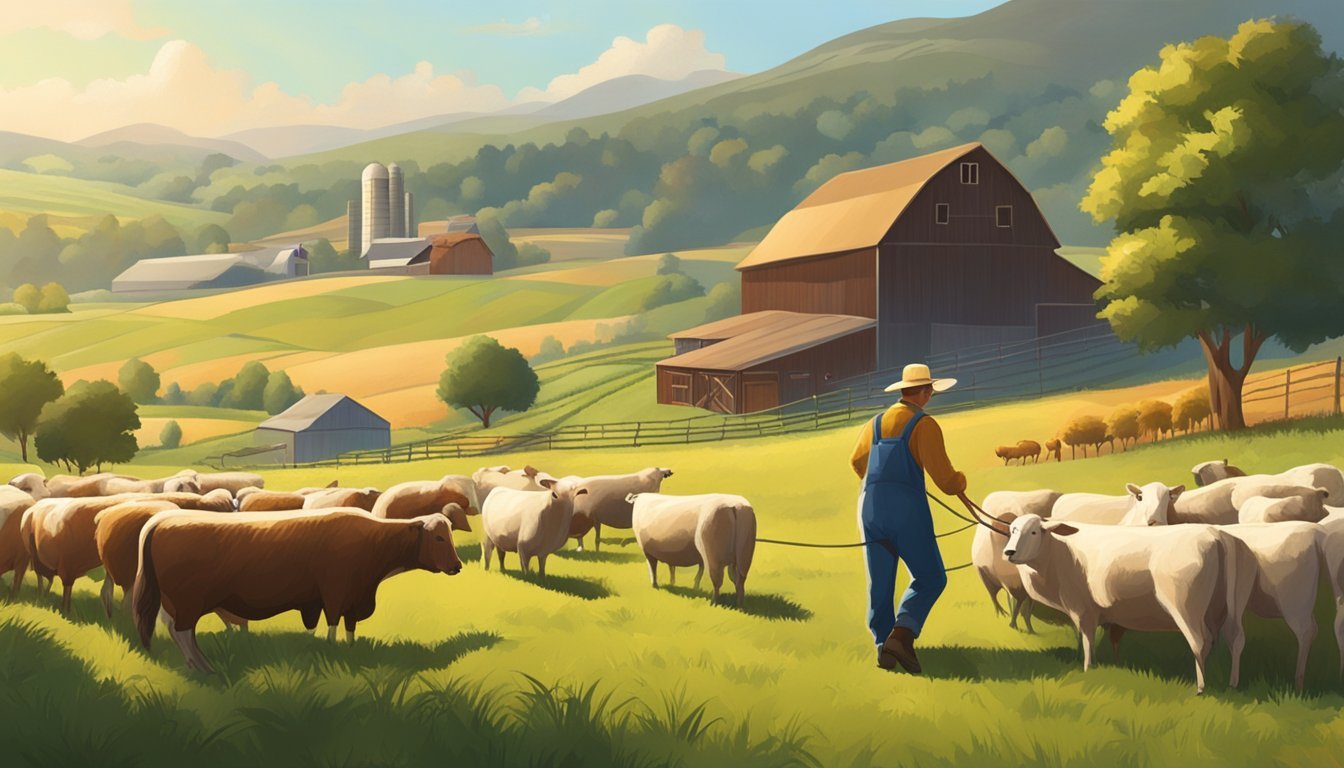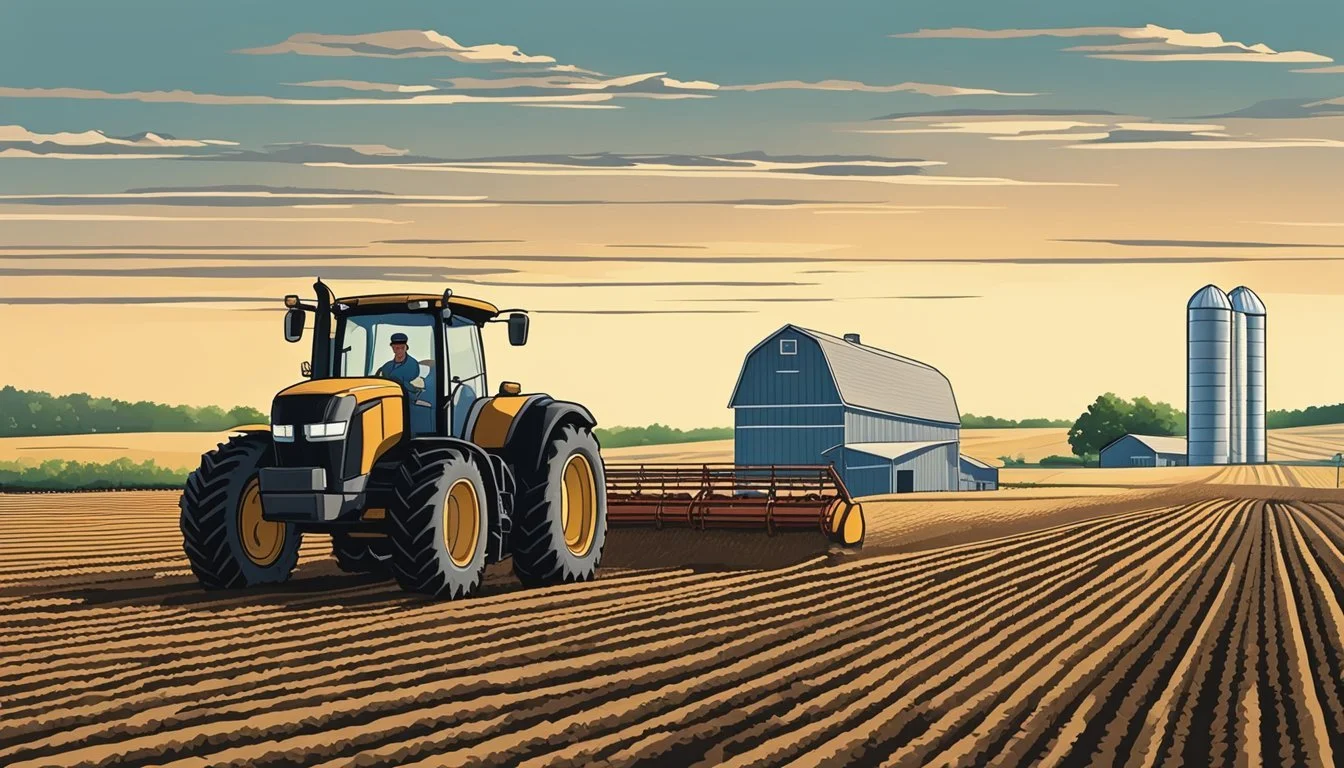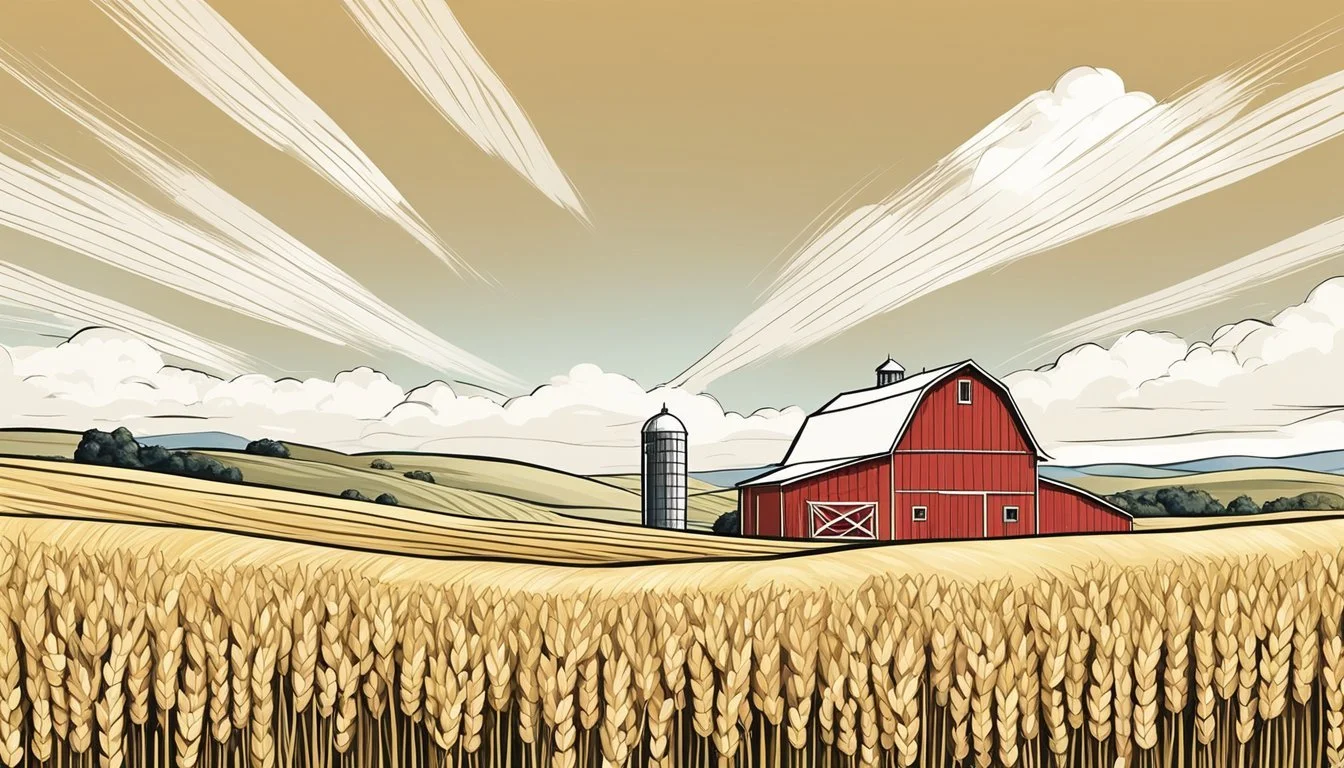Guide to Farming in Kansas
Essential Tips for Successful Agriculture
This Article is Part of Our State by State Farming Guide
Kansas's agricultural sector is a testament to the state's deep-rooted connection to the land and the continuity of its farming heritage. From the days of sickle and scythe to present-day precision farming with satellite technology, Kansas has evolved into a leader in various facets of agriculture. Its contribution to the state's economy is anchored by its dominance in wheat, grain sorghum, (how long does sorghum last?) and beef production, alongside a rapidly growing dairy sector and expanding animal agriculture industries.
The state benefits from a rich tapestry of agronomic conditions, with diverse soils and a range of freeze-free days that allow for a variety of crops to flourish. In Kansas, farming is not just an occupation; it represents a way of life that requires a careful blend of tradition and innovation. Aspiring and established farmers alike face challenges that necessitate strategic planning and adaptation to ensure both sustainability and profitability.
Resources for farmers in Kansas are plentiful, including educational programs like Farm Beginnings Training and support for business planning such as AgPlan's templates and financial tools. For those navigating the complexities of farm and ranch transition, options like the AgKansitions program offer guidance. Additionally, legal toolkits are available to facilitate land access and conservation. Understanding these resources and harnessing them effectively is essential for success in Kansas's dynamic agricultural landscape.
Understanding Kansas Agriculture
Kansas, recognized for its rich agricultural heritage, continues to shape the nation's agricultural framework. Kansas' farming is underscored by its suitable climatic conditions, fertile soil, and historical investment in effective farming practices.
Climate and Soil Conditions
In Kansas, a range of climate conditions and soil types contribute to the state's agricultural productivity. Central Kansas is characterized by a semiarid climate, favorable for wheat and grain cultivation, while Eastern Kansas supports a more diverse array of crops due to increased rainfall. The state's soil ranges from deep and fertile to more arid soils, accommodating a variety of crops. Kansas' climate has earned it the nickname "the Wheat State."
Key Crops and Livestock
The backbone of Kansas' agriculture comes down to several key crops and livestock:
Crops:
Wheat: Kansas leads the nation, growing over 23% of the country's wheat.
Grain Sorghum: Renowned for being the top producer, furnishing almost 64% of the domestic supply.
Soybeans: A significant crop, though not the leading product.
Livestock:
Beef production: A cornerstone of the state's agricultural output.
Dairy: The sector shows rapid growth contributing to the state's economy.
Historical Overview
Kansas agriculture has evolved dramatically since its statehood. Early settlers overcame the challenging prairie conditions through innovation and hard work. Historical data suggests a single farmer, using a traditional plow, could cultivate about two acres in one day. As technology progressed, including the advent of the sulky plow, productivity increased, allowing a single farmer to cultivate five to seven acres. This technological advancement was instrumental in Kansas becoming a pivotal agricultural state.
Agricultural Practice
In Kansas, agricultural practices are honed by generations of experience, utilizing a blend of traditional methods and modern advancements to ensure productivity and sustainability.
Seasonal Farming Activities
In Kansas, the farming calendar is dictated by the seasons. Farmers prepare the soil and plant crops such as wheat and sorghum in the spring, while ensuring that irrigation mitigates any impact from periodic droughts. Harvesting typically takes place in late summer to fall, with wheat harvest generally occurring in June and July, and grain sorghum harvest in the fall.
Soil Health and Management
Soil health is paramount in Kansas farming. Farmers employ crop rotation and conservation tillage to maintain soil structure and fertility. They also utilize:
Nutrient management: Tailoring fertilizer applications to match crop needs.
Cover cropping: Planting of cover crops helps to prevent soil erosion and enhances soil quality.
Sustainable Agriculture
Farmers in Kansas are increasingly adopting sustainable agriculture practices. These include:
Integrated pest management (IPM): Combines different management strategies and practices to grow healthy crops and minimize use of pesticides.
Water conservation: Techniques such as drip irrigation and low-pressure pivot systems to use water more efficiently.
Technological Implementations in Farming
Technology plays a crucial role in modern Kansas farming. Precision agriculture, using tools like GPS and data analytics, allows for precise planting, fertilizing, and watering. Technological advancements also include:
Farm management software: Streamlines operations by monitoring crop health and managing resources.
Automated machinery: Enhances efficiency, especially during peak growing and harvesting seasons.
Agricultural Business
In Kansas, agriculture is not just a way of life, but a thriving economic sector that contributes significantly to the state's economy. With a rich history in wheat, grain sorghum, and livestock, Kansas presents numerous agribusiness opportunities for family farms and entrepreneurs. The Kansas Department of Agriculture (KDA) offers a range of services to support business development, marketing, and the sale of local products.
Agribusiness Opportunities in Kansas
Kansas distinguished itself as a top producer in commodities such as wheat and grain sorghum, offering vast opportunities for agribusiness ventures. Family farms can explore diversification into niche markets or value-added processing to increase revenue streams. The state's agricultural landscape is diverse, presenting possibilities in both traditional and emerging agricultural sectors.
Key Agricultural Commodities in Kansas:
Wheat
Grain Sorghum
Livestock
Marketing and Selling Local Produce
Promoting local products plays a critical role in the success of Kansas agribusinesses. Developing effective marketing strategies helps farms connect with consumers and businesses, facilitating sustaining relationships. Agribusinesses leverage branding and direct marketing techniques to sell products at local farmers markets, through community-supported agriculture (CSA), or to local restaurants and schools.
Effective Marketing Strategies:
Branding and storytell\ing about farm traditions
Direct-to-consumer sales (e.g., CSAs and farmers markets)
Business-to-business sales (e.g., selling to local restaurants)
Kansas Department of Agriculture Services
The Kansas Department of Agriculture serves as an essential resource for those involved in agriculture business. They provide assistance with business planning, regulatory compliance, and accessing domestic and international markets. Additionally, the KDA offers programs targeting business development, such as the Kansas Agribusiness Retailers Association and the Kansas Agricultural Marketing Association, which are designed to support and enhance the capabilities of Kansas agribusinesses.
KDA Services to Support Agribusiness:
Business planning and financial assistance
Guidelines for operational compliance
Programs offering market access and agribusiness networking opportunities
Regulation and Support
In navigating the farming landscape of Kansas, it is essential to understand the regulations and support mechanisms in place. Farmers in Kansas need to adhere to a wide spectrum of rules and can benefit from multiple support entities offering guidance, advocacy, and education.
Farming Rules and Guidelines
The Kansas Department of Agriculture is the primary agency that enforces farming rules and regulations. Farmers are required to comply with state level guidelines which cover various aspects, from land use to animal health. Prospective farmers should consult detailed licensing guides and ensure they meet all stipulated requirements, including those set forth by local and federal entities.
Agricultural Advocacy and Associations
Advocacy plays a crucial role in Kansas agriculture, with organizations like the Kansas Rural Center (KRC) championing the interests of local farmers. These associations provide a voice on policy matters and offer comprehensive support in areas such as business formation, management practices, and sustainable farming techniques.
Funding and Education Programs
Kansas offers diverse programs to assist new and established farmers, focusing on education and access to funding. These include:
Beginning Farmer and Rancher Program: Offers instruction on business management, record-keeping, and access to land and capital.
State and Federal Farm Assistance Programs: These are vital for financial support and disaster relief.
Kansas State University (K-State): Boasts specialists and extension services dedicated to agricultural best practices and innovation.
Entities like K-State serve as invaluable resources for research-based information and continuing education for the farming community.
Crop-Specific Farming Techniques
Kansas's agriculture is characterized by specialized techniques for each crop, ensuring optimal yield.
Wheat and Grain Sorghum Cultivation
Wheat, especially the Turkey hard red winter wheat introduced by Mennonites in 1874, has long been a staple crop in Kansas. Adapting to the state's climate, farmers plant this variety in the fall, which then lies dormant over the winter and is harvested in early summer. Advancements in seed technology and innovation in farming practices have maintained Kansas as the leading wheat producer in the United States. They emphasize soil conservation and rotation with other crops to maintain soil health.
Grain Sorghum, also known as milo, thrives in Kansas's more arid environments where corn might struggle. It demands less water, making it an excellent choice for areas with water usage concerns. For optimal growth, farmers plant sorghum seeds when the soil temperature reaches about 60°F, typically between mid-May and early June. Crop rotation with soybeans or wheat is a common practice to manage pests and diseases and to improve soil fertility.
Corn, Beans, and Sunflowers Growth Tactics
Corn is a major crop in Kansas, requiring more precise management for water, nutrients, and pest control. The use of drip irrigation and genetically modified seeds has enabled farmers to increase efficiency and production. Corn is typically planted when the soil temperature is consistently above 50°F.
Beans, including edible dry beans and soybeans, are an important rotational crop, improving soil health through nitrogen fixation. Kansas farmers use precision planting techniques and machinery for beans to ensure the right planting depth and spacing, vital for maximizing yields.
Sunflowers are another crop that Kansas farmers cultivate, using specific planting patterns to optimize sunlight exposure and reduce plant competition. They require less water than many crops, making them suitable for some of the drier regions in Kansas. Sunflowers are typically planted from late May to early July, depending on the desired harvest time.
Cotton and Grape Vineyard Care
Cotton production in Kansas has increased, with careful focus on planting dates and seed selection to accommodate the shorter growing season. Pest management and timed irrigation are critical for successful cotton cultivation. Cotton is often planted in late April to early May in Kansas.
Kansas's grape production, notably for wine, has benefited from strategic vineyard placement and management. Grapes require well-draining soil and careful canopy management to ensure adequate air flow and sunlight penetration. Vineyards must be monitored for disease and pests, and growers often utilize innovative trellising systems to support vine health and productivity. Grape growers in Kansas typically consider the varietal characteristics and local microclimate when managing their vineyards.
Animal Husbandry
In Kansas, animal husbandry plays a critical role in the state's agricultural output, focusing on the effective management and care of livestock to optimize their contribution to food production and hunting industries.
Cattle and Poultry Management
Cattle farms in Kansas are foundational to the state's agriculture, requiring detailed attention to feed, health, and breeding programs. Strategies for feed efficiency and disease prevention are vital for food safety and overall herd well-being.
Feed Management:
Optimal nutrition that meets seasonal requirements.
Regular assessment of feed quality and pasture conditions.
Health Regimens:
Vaccination schedules based on herd history and prevalent diseases.
Routine veterinary check-ups and immediate addressing of health issues.
Poultry management focuses on maintaining a healthy environment for both broilers and laying hens. Housing conditions are regulated to ensure adequate space, ventilation, and temperature for productivity and egg quality.
Housing Specifications:
Clean, spacious coops with proper ventilation systems.
Controlled lighting schemes to maximize laying cycles.
Disease Control:
Biosecurity measures to prevent avian diseases.
Regular health inspections and adherence to sanitary protocols.
Game and Livestock for Hunting Purposes
The management of livestock for hunting includes species such as deer and fowl, often raised on game farms and ranches under the careful oversight to ensure their health and viability for sustainable hunting activities.
Habitat Creation:
Naturalistic environments that support the animals' developmental needs.
Incorporation of beneficial insects and flora to promote a balanced ecosystem.
Population Control:
Controlled breeding to prevent overpopulation.
Monitoring of game health to ensure a high-quality hunting stock.
In Kansas' diverse agricultural landscape, animal husbandry practices are refined to balance production demands with environmental stewardship and ethical treatment of animals.
Processing and Storage
In Kansas agriculture, efficient processing and storage systems are essential for maintaining the quality and safety of grain sorghum, wheat, and other agricultural produce. These systems ensure that crops and meats are preserved, processed, and stored effectively to retain nutritional value and prevent spoilage.
Grain Storage Solutions
Grain sorghum and wheat, two of Kansas's primary crops, require robust storage solutions.
Silos and Grain Bins: These are commonplace for storing large quantities of harvested grain, providing protection from weather and pests.
Temperature Control: It is vital to maintain optimal temperatures inside storage facilities to prevent the growth of mold or other spoilage organisms.
Moisture Levels: Farmers must monitor grain moisture levels closely, aiming for a range of 12-14% to ensure longevity and prevent spoilage.
Aeration Systems: These circulate air through the grains to maintain even temperature and moisture levels.
By employing these techniques, Kansas farmers can effectively store significant quantities of grain, ensuring a steady supply for processing and sale.
Meat and Crop Processing
Kansas's meat and agriculture sectors are heavily regulated to ensure food safety during processing.
Facility Inspection: The Kansas Meat and Poultry Inspection Program mandates comprehensive inspections for meat processing facilities to adhere to strict health and safety standards.
Equipment Sanitization: Hygiene is paramount, with equipment needing regular sterilization to prevent contamination.
Product Testing: Processed products undergo testing for pathogens to certify safety before reaching consumers.
Through rigorous processing practices, Kansas agriculture maintains a consistent level of quality and safety in its food products, contributing significantly to the state and national markets.
Special Interest Farming
Special interest farming in Kansas caters to both the innovative urban agriculturist and the dedicated organic farmer looking to tap into niche markets. These alternative agricultural practices employ various technologies and strategic planning to thrive in Central Kansas and beyond.
Urban Agriculture and Gardening
Urban agriculture and gardening are gaining traction in areas like Central Kansas, where gardeners utilize smaller plots within city limits to grow produce. Planning authorities sometimes offer support in the form of urban garden zoning and resources to encourage this sustainable practice. Agribusinesses are recognizing the service potential for urban dwellers by providing technology and engineering expertise to maximize yield in limited spaces.
Advantages:
Accessibility for city residents
Sustainable local food sources
Challenges:
Limited space
Need for specialized technology
Organic Farming and Niche Markets
Organic farming in Kansas serves a specialized sector of the agriculture market, with a focus on producing without synthetic pesticides or fertilizers. Agribusinesses have noticed a rising demand from consumers for organic products, leading to the development of niche markets within the state’s expansive agricultural framework.
Practices:
Use of natural pest controls
Commitment to soil health
Niche Opportunities:
Specialty grains
Organic meats and dairy
Farmers in these markets must adhere to strict certification standards, demonstrating a clear commitment to the environment and sustainable farming practices.

